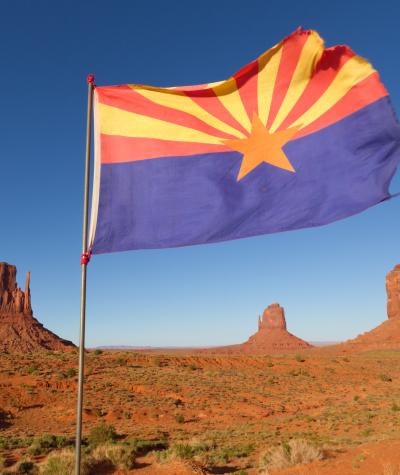This week, Arizona passed a new law that will restore the right to vote to many people with past convictions who were unable to vote simply because they could not pay off fines.
Arizona has one of the most complicated and harsh felony disenfranchisement laws in the country, stripping the right to vote from approximately 221,000 citizens. Upon a felony conviction, everyone loses the right to vote in the state. But some have the right to vote automatically restored when they complete their sentence. Others have to petition a court to be re-enfranchised. The new law is an important step in the right direction because it expands automatic rights restoration to many more Arizonans by eliminating the requirement that an individual pay all fines to have their rights automatically restored. In a democracy, the right to participate should not depend on the size of your wallet. Only a handful of states still require payment of legal financial obligations to exercise the right to vote and Arizona’s HB 2080 is a positive step towards remedying this modern-day poll tax.
CLICK HERE IF YOU HAVE QUESTIONS ABOUT HOW ARIZONA’S NEW LAW COULD IMPACT YOUR RIGHT TO VOTE.
However, there is still much work to do. Those with multiple felony convictions – even those arising from the same incident – do not qualify for automatic restoration. And Arizona will still require payment of restitution before automatic restoration, which is still a wealth barrier to the franchise. The law clarifies that individuals with unpaid restitution can petition for rights restoration – a definite improvement – but that petition process is burdensome.
Those who have to petition a court (either because of restitution or because they have multiple felony convictions) face the additional difficulties of trying to navigate the legal system on their own or paying a lawyer. Only a few counties have pro se (i.e. not for lawyers) forms and even those are not simple. Maricopa County’s form, for example, is eight pages long – plus an additional five pages of instructions. The petition process also requires that a person present a copy of their final discharge from their sentence. This is a piece of paper that many people simply do not have. And it’s an unnecessary hurdle for most people since the state court should be able to verify internally that a person has completed their Arizona state court sentence.
Moreover, the path to rights restoration will remain inscrutable for many impacted people. In Arizona, an individual’s voting rights status still depends on the interaction of many factors: whether they have a single or multiple convictions, whether they have completed their sentence, including probation and parole, whether they have paid restitution, whether they served time in prison, and whether their conviction was in Arizona, out of state, or in federal court. Under those circumstances, even knowing whether your right to vote has been restored or if you will need to take additional steps can seem to require a lawyer. In fact, our Restore Your Vote organizers who worked in Arizona last fall found that the majority of the people they spoke with who had had their rights automatically restored had no idea that they could vote again. The new law requires an explanation of rights at the time of sentencing – another improvement – but for most, this is years away from when that information will be most relevant – which is when they complete their sentence and therefore can potentially vote again. Campaign Legal Center created the RestoreYourVote.org toolkit to alleviate this information barrier, but the impetus should be on the state, not an individual or a non-profit, to make its laws accessible and provide assistance for the exercise of this fundamental right
Nonetheless, Arizona’s new law is an undeniable step in the right direction. Arizona’s new law is part of a national trend against felony disenfranchisement. The most visible step forward in the past year was the passage of Amendment 4 in Florida. We should celebrate these incremental acts as they add more voters to the electorate, creating a more equal and participative democracy. They are also squarely in line with public opinion across party lines supporting second chances for people with past convictions.
We still have a long way to go. No American should ever lose their right to vote. America’s history of felony disenfranchisement is rooted in Jim Crow and these policies continue to disproportionately harm communities of color. Voting is a fundamental right and there is no benefit to the goals of our criminal justice system served by disenfranchisement. In fact, studies show that restoring the right to vote lowers recidivism rates and helps with reintegration into society. For now, CLC will focus on ensuring that Arizona voters that benefit from this law know it and get registered to vote.

